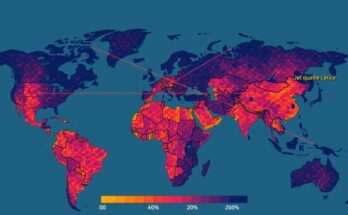As of December, Nigeria’s annual inflation rate nearly reached a 29-year high at 34.8%, with significant contributions from transportation costs. The National Bureau of Statistics plans to revise its methodology to potentially lower this figure. The Central Bank raised interest rates to combat the inflation surge, with expectations for price growth to ease in the coming year.
Nigeria has reported an annual inflation rate that reached its highest point in nearly 29 years as of December prior to an impending overhaul of its inflation data methodology. According to the National Bureau of Statistics, consumer prices climbed 34.8%, a slight increase from 34.6% in November. Economists had predicted a marginally higher inflation rate of 34.9% based on Bloomberg survey estimates.
Transportation costs have emerged as the main drivers of this inflationary trend, with food inflation showing a minor decrease to 39.8% from 39.9% in the previous month. Meanwhile, the core inflation rate—which excludes agricultural products and energy costs—witnessed an uptick, rising to 29.3% from 28.75%. Overall, prices increased by 2.4% in December alone.
The upcoming revisions to the inflation data methodology are expected to significantly alter how inflation is measured. For the first time in 16 years, the National Bureau of Statistics will rebase its index and include additional items, with 2024 set as the new reference year. This change will likely result in a lower inflation rate, especially as the weight of food in the index is reduced from 51.8% to 40.1%.
As inflation surges within Africa’s most populous nation, the Central Bank of Nigeria had no choice but to raise its key interest rate substantially, increasing it by 875 basis points during the last year. Nonetheless, Governor Olayemi Cardoso has indicated expectations for a gradual easing of price growth this year, with further monetary policy decisions anticipated. The next interest rate decision is scheduled for February 18.
The inflation data in Nigeria has reached a critical level, posing challenges not only for consumers but also for policymakers who aim to manage the economic landscape effectively. An expected overhaul of data compilation methods and a focus on adjusting the consumer price index signify a significant shift in how inflationary trends will be observed and understood in the future. With transportation costs leading the price increases and rising interest rates, the economic repercussions are profound, necessitating careful monitoring and response from the Nigerian Central Bank.
In summary, Nigeria’s inflation rate has surged to its highest level in almost three decades, prompting a significant reevaluation of the underlying data methodology. The increase in consumer prices, primarily driven by transportation costs, has compelled the Central Bank to adjust its interest rates aggressively. As new data is set to be released, there are indications that inflation may begin to ease, depending on the adjustments made to the consumer price index.
Original Source: financialpost.com




